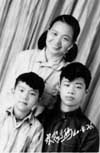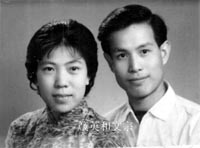
My College Days
 My
father, who had worked for the revolution, was executed by the Kuomintang
in Xiamen (Amoy) on October 16, 1949,
the eve of their flight to Taiwan. The following day, the PLA (Chinese
People¡¯s Liberation Army) took Xiamen (Amoy). When my father died a
martyr, he was 34; my mother was 28, I was 8 and my brother only 3. My
father, who had worked for the revolution, was executed by the Kuomintang
in Xiamen (Amoy) on October 16, 1949,
the eve of their flight to Taiwan. The following day, the PLA (Chinese
People¡¯s Liberation Army) took Xiamen (Amoy). When my father died a
martyr, he was 34; my mother was 28, I was 8 and my brother only 3.
 Left
in the world without him, we were honored with a
red wooden billboard at the door which read: "Glorious Martyr¡¯s
Family," but we had very trying times. The 24
yuan (Chinese dollars) per month which Mother earned from
a temporary job was far from being enough to meet the family needs,
even though we attended school on government subsidies and even though
Mother¡¯s monthly wages was later increased to 38 yuan. What was
worse, we were fatherless. When Mother was out working, I often had
to look after my brother by taking him to the ponds and the river, where
we tried to fish with fishing rods I made from bamboo sticks, sewing
thread and safety pins. How I envied those children who had fathers
to show them how to swim! How I envied my cousins whose father had bought
them Ping-Pong paddles! Left
in the world without him, we were honored with a
red wooden billboard at the door which read: "Glorious Martyr¡¯s
Family," but we had very trying times. The 24
yuan (Chinese dollars) per month which Mother earned from
a temporary job was far from being enough to meet the family needs,
even though we attended school on government subsidies and even though
Mother¡¯s monthly wages was later increased to 38 yuan. What was
worse, we were fatherless. When Mother was out working, I often had
to look after my brother by taking him to the ponds and the river, where
we tried to fish with fishing rods I made from bamboo sticks, sewing
thread and safety pins. How I envied those children who had fathers
to show them how to swim! How I envied my cousins whose father had bought
them Ping-Pong paddles!
By the time I was at college learning English
(picture below), our home was almost bare of furniture. All had been sold piece by piece over the years in
exchange for food, especially in the early 1960¡¯s when the whole country
suffered from food shortages after the disastrous
"Great Leap Forward" of 1958. Many of my classmates in
the English department were overseas Chinese or their dependents, who
had money and extra food supplies and who dined in a secluded campus
dining hall with fine drapery. I was often hungry, as millions in the
country were. My additional supplies were the rice coupons and dollar
bills that Mother sent with her letters. She once sent me a food parcel
of home-made cake¡ªa mixture of ground rice-husk and extracted sugar-cane
sediment. Never had I tasted anything as delicious as that!
bare of furniture. All had been sold piece by piece over the years in
exchange for food, especially in the early 1960¡¯s when the whole country
suffered from food shortages after the disastrous
"Great Leap Forward" of 1958. Many of my classmates in
the English department were overseas Chinese or their dependents, who
had money and extra food supplies and who dined in a secluded campus
dining hall with fine drapery. I was often hungry, as millions in the
country were. My additional supplies were the rice coupons and dollar
bills that Mother sent with her letters. She once sent me a food parcel
of home-made cake¡ªa mixture of ground rice-husk and extracted sugar-cane
sediment. Never had I tasted anything as delicious as that!
Yannan and his mother
and brother in 1960
I was needy but not miserable. Most of
my classmates and teachers were kind to me, and I had Mother to care for me and books to entertain me. While
my fellow students were having a good time in the dances that were held
to keep them from dwelling on the hard times, I kept to my books. I
read through the four graded volumes of Nesfield¡¯s English Grammar,
which I came by one by one from a second-hand bookstore, and was soon
in a position to tell the syntactical difference between "please
sit down" and "sit down please." I also learned touch
type during the National Day holiday of 1959, when a professor lent
me his typewriter, a 1920 Underwood. For five days and nights of this
10th anniversary holiday, I sat at my bedside desk typing¡ªcopying
whole poems of Percy Busshe Shelley, Henry Wadsworth Longfellow and
Rabindranath Tagore into loose-leaf notebooks. That great-grandfather
of a typewriter worked after I moistened the dry ribbon with kerosene.
In
me, and I had Mother to care for me and books to entertain me. While
my fellow students were having a good time in the dances that were held
to keep them from dwelling on the hard times, I kept to my books. I
read through the four graded volumes of Nesfield¡¯s English Grammar,
which I came by one by one from a second-hand bookstore, and was soon
in a position to tell the syntactical difference between "please
sit down" and "sit down please." I also learned touch
type during the National Day holiday of 1959, when a professor lent
me his typewriter, a 1920 Underwood. For five days and nights of this
10th anniversary holiday, I sat at my bedside desk typing¡ªcopying
whole poems of Percy Busshe Shelley, Henry Wadsworth Longfellow and
Rabindranath Tagore into loose-leaf notebooks. That great-grandfather
of a typewriter worked after I moistened the dry ribbon with kerosene.
In my third year at college, I bought a grandfather typewriter for myself
for 70 yuan¡ªan astronomical figure for me at the time. It was
purchased after repeated shop visits and many second thoughts, and after
a classmate loaned me 30 yuan to add to the 40 yuan that
Mother had remitted to me. That big debt of 30 yuan was later
paid off for me, without my prior knowledge, by two other classmates
who looked upon me as their little brother and who, incidentally, became
husband and wife upon graduation (picture on left).
my third year at college, I bought a grandfather typewriter for myself
for 70 yuan¡ªan astronomical figure for me at the time. It was
purchased after repeated shop visits and many second thoughts, and after
a classmate loaned me 30 yuan to add to the 40 yuan that
Mother had remitted to me. That big debt of 30 yuan was later
paid off for me, without my prior knowledge, by two other classmates
who looked upon me as their little brother and who, incidentally, became
husband and wife upon graduation (picture on left).
Yannan's college classmates
in 1963
 College Classmates & Professors
College Classmates & Professors
|
|

Updated
November 10, 2015
网页更新
2015-11-10
|

